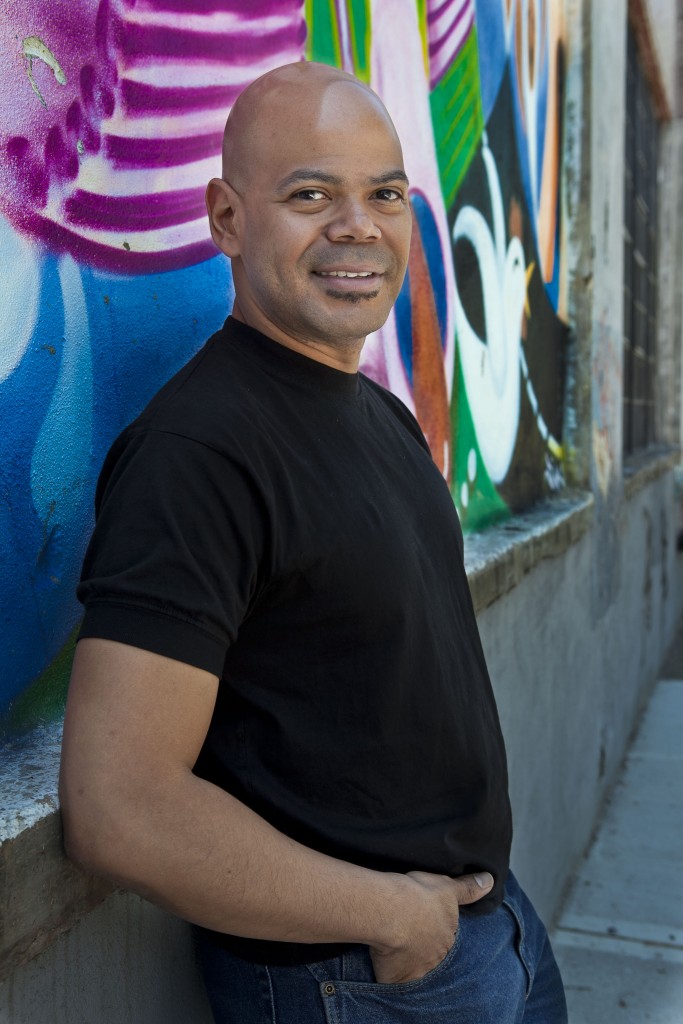A celebrated author reflects on his debut novel, Chulito.

Charles Rice-Gonzalez ’85, author of Chihulto
When Charles Rice-Gonzalez ’85 said, “At Adelphi, I was one of those hyperactive students,” it’s easy to believe. Thirty years later, he still exudes energy, even while eating lunch in a Bronx diner, where he recounts volunteering at Adelphi’s newspaper, joining (and becoming president of) Circle K International, serving as a student ambassador and attending every cultural performance and exhibition he possibly could. “When I graduated, I was bored—I only had a job,” he said, with an infectious laugh.
He soon found new undertakings. “Part of what broke my boredom after graduation was coming out,” he said. “My hyperactivity turned to activism.” In 1986, coming out was his New Year’s resolution, and he became part of the queer movement in the Bronx.
That’s where he was, sitting on some steps during his lunch break (he was working for the Bronx borough president), when he had the experience that inspired his acclaimed debut novel, Chulito (Magnus Books, 2011). “I saw two young kids running by, yelling, ‘Ew, get away from Tony. Tony’s gay.’ And then Tony came running behind them, saying, ‘Yo, yo, wait up! I’m not gay.’ And I started to think, ‘What if he was?’”
Inspired by a love of creative writing he’d discovered and developed at Adelphi, Rice-Gonzalez explored this question by writing some short scenes around the character. “I imagined he was the charismatic star of the neighborhood. Everybody knows him; everybody loves him. It raises the stakes—when he makes this decision to come out, he can’t do it and not be noticed.”
Eventually, he decided to set Chulito’s story in the Hunts Point neighborhood of the Bronx, where Rice-Gonzalez was living at the time. “I knew the language, the ways people behaved, the value systems, and I was able to bring that to the book,” he said. “The South Bronx had such a messed-up reputation; I wanted to highlight the humanity of the neighborhood.” Chulito became the coming-out story of a 16-year-old high school dropout, who hangs out on a vibrant, gritty corner, where macho behavior is the norm of masculinity.
The author didn’t realize just how unique this perspective was until an interviewer asked, “How does it feel to write the first queer Puerto Rican novel set in the U.S.?” Rice-Gonzalez, who was born in Puerto Rico, was taken aback. “I was like, is it the first? I’m going to have to take that in.”
That particularity may help the book resonate with readers, he hopes, the way other books did for him. “When I came out, there were a lot of books I could go to,” he said. “Most of the writers were white, and they were writing about the white community. In a way, it didn’t matter—it was just great to find queer content. As human beings, we’re always looking for signals to validate who we are.”
So while Chulito—which has received awards and recognitions from the American Library Association and the National Book Critics Circle—is not a true story, it is, he said, “a possibility.” He adds, “This could be a path for some young kid in the South Bronx. He might read this and say, ‘Maybe I can be who I am and find some support.’”
Creating that kind of support is, in part, what led to his co-founding the nonprofit Bronx Academy of Art and Dance (BAAD!) with dancer Arthur Aviles, his partner at the time. Seventeen years ago, they staged a dance performance in an unused warehouse. That one-time event became an ongoing project, now housed in a small Gothic Revival stone chapel next to St. Peter’s Episcopal Church in the Bronx. Today BAAD! presents empowering works for women, people of color and the LGBT community. “It’s about integration and a position of pushing forward, saying, ‘Let’s be prominent,’” he said.
He serves as executive director at BAAD! but, as always, Rice-Gonzalez has many other projects on his plate. He is also a distinguished lecturer at Hostos Community College – CUNY. He has plans to write about the history of the queer movement in the Bronx. And he’s working on some short stories about love. Two plays are taking shape in his mind, one about jazz singer Johnny Hartman and one about Eartha Kitt (in which she speaks from the afterlife). And he’s not finished with Chulito and his love interest, Carlos. A second book— currently called Hunts Point, starting three years after Chulito ends and focusing on Carlos’ story—is in the works.
In short, he is taking to heart some of his own advice. “One thing I always tell college students is that they should contribute something to the world, whatever it is—art, a family, a business,” he said. “What are the things we leave behind?”
For further information, please contact:
Todd Wilson
Strategic Communications Director
p – 516.237.8634
e – twilson@adelphi.edu